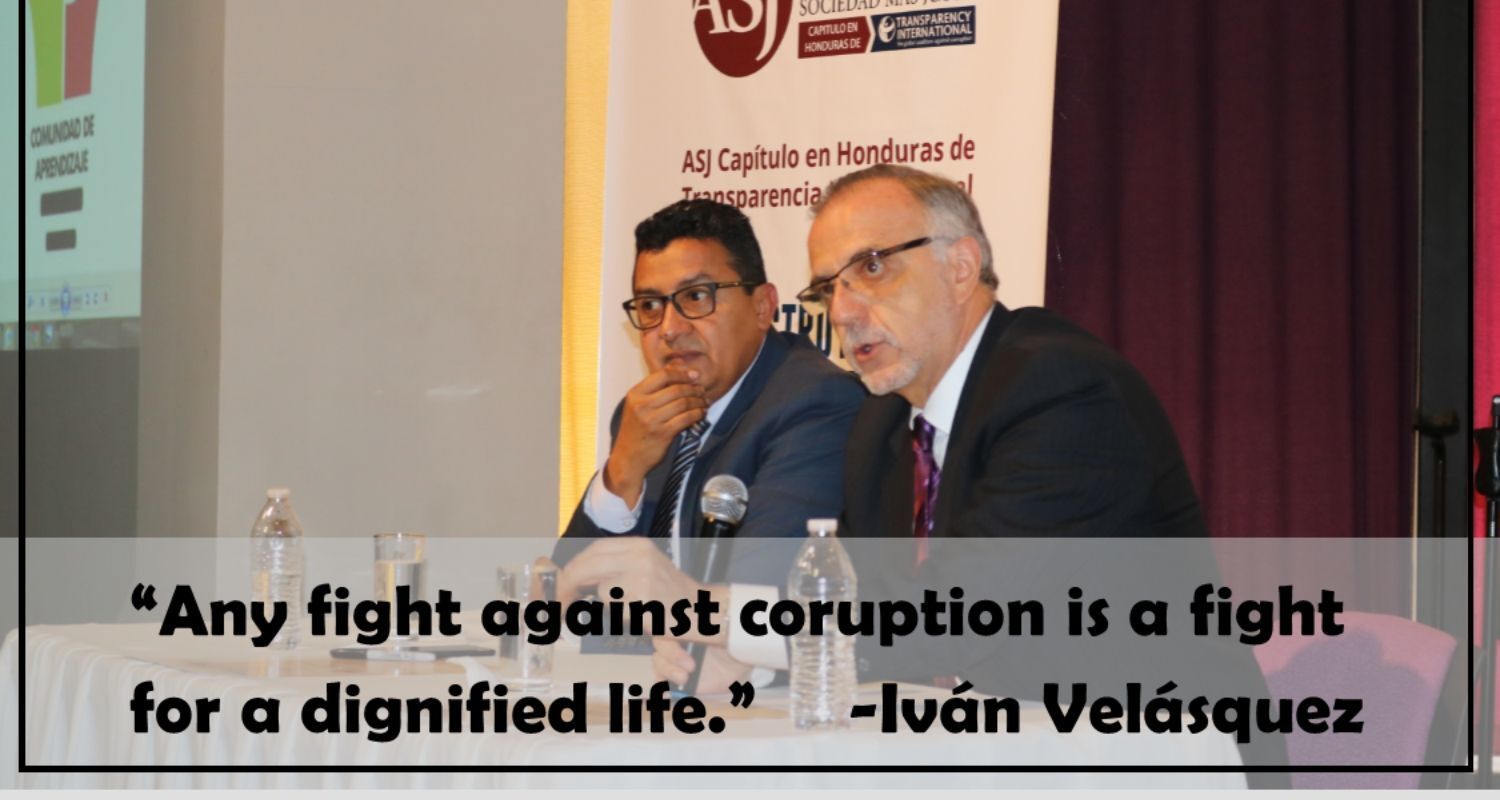August 16, 2017
“Communities of Learning,” an Association for a More Just Society initiative, reminded Honduras that corruption is still a problem worth fighting against and encouraged its citizens to “Know, Learn, Act, and Change.”
The three-conference series was hosted by ASJ (formerly known as AJS) and Impactos, a Counterpart International and USAID program, and was designed to create a space for key leaders in the fight against corruption to gather new information, reflect together, and mobilize for change. Ivan Velasquez, commissioner for the International Commission against Impunity in Guatemala (CICIG), inaugurated the series as the keynote speaker for the conference, “Fighting Grand Corruption: the Experience of the CICIG”.
Velasquez has an extensive record in the fight against corruption in his native Colombia. In 2011 he was granted the International Bar Association Human Rights Award, and in 2012 the German Association of Judges recognized his work in the fight against impunity and the protection of fundamental rights. Today Velasquez continues that fight with the CICIG, a United Nations (UN)-appointed commission that investigated and incarcerated Guatemala’s former president, Otto Perez Molina, and several members of his cabinet for their involvement in a corruption scandal.
“It is not possible to advance successful work in the fight against corruption if a reaction from the citizens is lacking,” Velasquez said as he emphasized the importance of citizen participation in the justice system – a factor he believes was key in the success of the CICIG in Guatemala.
During the forum, Velasquez addressed the attendees alongside Juan Jiménez Mayor, spokesperson for the Mission to Support the Fight against Corruption and Impunity in Honduras (MACCIH); Oscar Chinchilla, Honduras’ Attorney General; and Carlos Hernández, ASJ-Honduras Director and representative for Transparency International (TI), one of the world’s largest anti-corruption organizations.
This conference was the first public meeting between representatives of the CICIG, a commission with more than 10 years of experience, and the MACCIH, created a year ago by the Organization of American States (OAS) to aid the justice system in Honduras.
In other conferences, ASJ brought experts from across Latin America together to share their perspectives.
“There cannot be a space for our biggest enemy, organized crime, to infiltrate our institutionality, our democracy and ultimately destroy our Rule of Law. We cannot allow that.” remarked Alberto Precht, representative for Transparency International’s chapter in Chile.
Precht encouraged the attendants, including prominent political figures and candidates, to “maintain a direct, frontal combat against corruption” and treat the Honduran electorate with dignity. He also pointed out that a responsible and transparent management of political finances is key in a healthy democracy.
Eduardo Bohórquez, director of the TI chapter in Mexico highlighted the success of “Tres de Tres” (“three out of three”), an initiative that calls Mexican political candidates and public functionaries to publish their tax returns, assets and conflict of interest declarations. ASJ is currently implementing “Tres de Tres” in Honduras, securing commitments from Presidential, Congressional, and mayoral candidates to self-disclose this information.
“If we want the next electoral process to be performed within the legal framework, it requires at least three essential conditions: clean campaign financing, unimpeachable candidates and an honest vote counting process.” Carlos Hernández said as he addressed an audience that is preparing to choose their authorities in voting booths later this year.
The intensity of wanting to see a stronger and more transparent Honduras remained until the final “Communities of Learning” forum. Ana Garrido, former functionary with the government of Spain and whistleblower in one of the country’s greatest corruption scandals, addressed the audience via videoconference in the conference, “The Role of the Whistleblower in the Fight against Corruption”.
“Every day more public employees say no to corruption. The fruit of their accusations entails numerous imputations and condemnations of white collar criminals. Those results make risking their future and lives for the sake of common good worth something,” Garrido said.
Garrido was joined by José Agüero Echenique, former judge and whistleblower in a case of influence peddling in Honduras’ judiciary system; Beatriz Otero, from the MACCIH; and Lester Ramírez, Investigations coordinator for ASJ-Honduras.
Both Echenique and Garrido agreed that the role of the whistleblower is not easy, but it is extremely necessary. Otherwise whoever is aware of corruption but doesn’t report it becomes a contributor to the corrupt system.
Otero and Ramirez shared the facts and benefits of supporting and protecting whistleblowers from political and social retaliation. Ramirez also reminded the audience that ASJ in collaboration with the Public Prosecutors’ Office developed a mobile app that allows citizens to report abuse and corruption of any kind.
Through its three conferences, “Communities of Learning” brought civil society leaders of international prominence together to discuss topics important to Honduran society. Experts in the fight against corruption and impunity encouraged Honduran citizens to be involved and committed in the justice process of their country by supporting the justice system, demanding transparency from politicians and denouncing corruption.
In this and many other ways, ASJ is leading essential conversations about transparency and accountability in Honduras, working to promote functioning government systems that contribute to a more just society for all of the country’s inhabitants.
This blog was written by José Ricardo Salinas, a communications intern with ASJ.



















